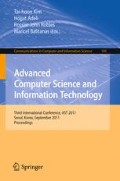Abstract
In this paper, we propose a new energy efficient clustering scheme to prolong the network lifetime by reducing energy consumption at the sensor node. Every node will determine whether to participate in clustering with a certain probability, based on the local sensor density. This scheme is useful under the assumption that sensor nodes are deployed unevenly within the sensing area. By adjusting dynamically the probability of participating in clustering, the energy consumption of the network is reduced and the lifetime of the network is extended. The major improvement in power consumption happens in densely populated areas, where the probabilities of a node skipping a round of clustering are higher. Through computer simulation, we verified that the proposed scheme is more energy efficient than the LEACH clustering scheme in densely populated areas, while maintaining similar performance otherwise.
Access this chapter
Tax calculation will be finalised at checkout
Purchases are for personal use only
Preview
Unable to display preview. Download preview PDF.
References
Banerjee, S., Khuller, S.: A Clustering Scheme for Hierarchical Control in Multi-hop Wireless Networks. In: Proceedings of IEEE INFOCOM. IEEE Press, Los Alamitos (2001)
Basagni, S.: Distributed Clustering Algorithm for Ad-hoc Networks. In: International Symposium on Parallel Architectures, Algorithms, and Networks (I-SPAN) (1999)
Chatterjee, M., Das, S.K., Turgut, D.: WCA: A Weighted Clustering Algorithm for Mobile Ad Hoc Networks. In: Cluster Computing, pp. 193–204 (2002)
Kwon, T.J., Gerla, M.: Clustering with Power Control. In: Proceeding of MilCOM 1999 (1999)
Bandyopadhyay, S., Coyle, E.: An Energy-Efficient Hierarchical Clustering Algorithm for Wireless Sensor Networks. In: Proceedings of IEEE INFOCOM (2003)
Amis, A.D., Prakash, R., Vuong, T.H.P., Huynh, D.T.: Max-Min D-Cluster Formation in Wireless Ad Hoc Networks. In: Proceedings of IEEE INFOCOM (2000)
Heinzelman, W.R., et al.: Energy-Efficient Communication Protocol for Wireless Microsensor Networks. In: Proceedings of the 33rd HICSS 2000 (2000)
Younis, O., Fahmy, S.: Distributed Clustering in Ad-hoc Sensor Networks: A Hybrid, Energy-Efficient Approach. In: Proceedings of IEEE INFOCOM. IEEE Press, Los Alamitos (2004)
Author information
Authors and Affiliations
Editor information
Editors and Affiliations
Rights and permissions
Copyright information
© 2011 Springer-Verlag Berlin Heidelberg
About this paper
Cite this paper
Kim, JS., Byun, TY. (2011). A Density-Based Clustering Scheme for Wireless Sensor Networks. In: Kim, Th., Adeli, H., Robles, R.J., Balitanas, M. (eds) Advanced Computer Science and Information Technology. AST 2011. Communications in Computer and Information Science, vol 195. Springer, Berlin, Heidelberg. https://doi.org/10.1007/978-3-642-24267-0_32
Download citation
DOI: https://doi.org/10.1007/978-3-642-24267-0_32
Publisher Name: Springer, Berlin, Heidelberg
Print ISBN: 978-3-642-24266-3
Online ISBN: 978-3-642-24267-0
eBook Packages: Computer ScienceComputer Science (R0)

